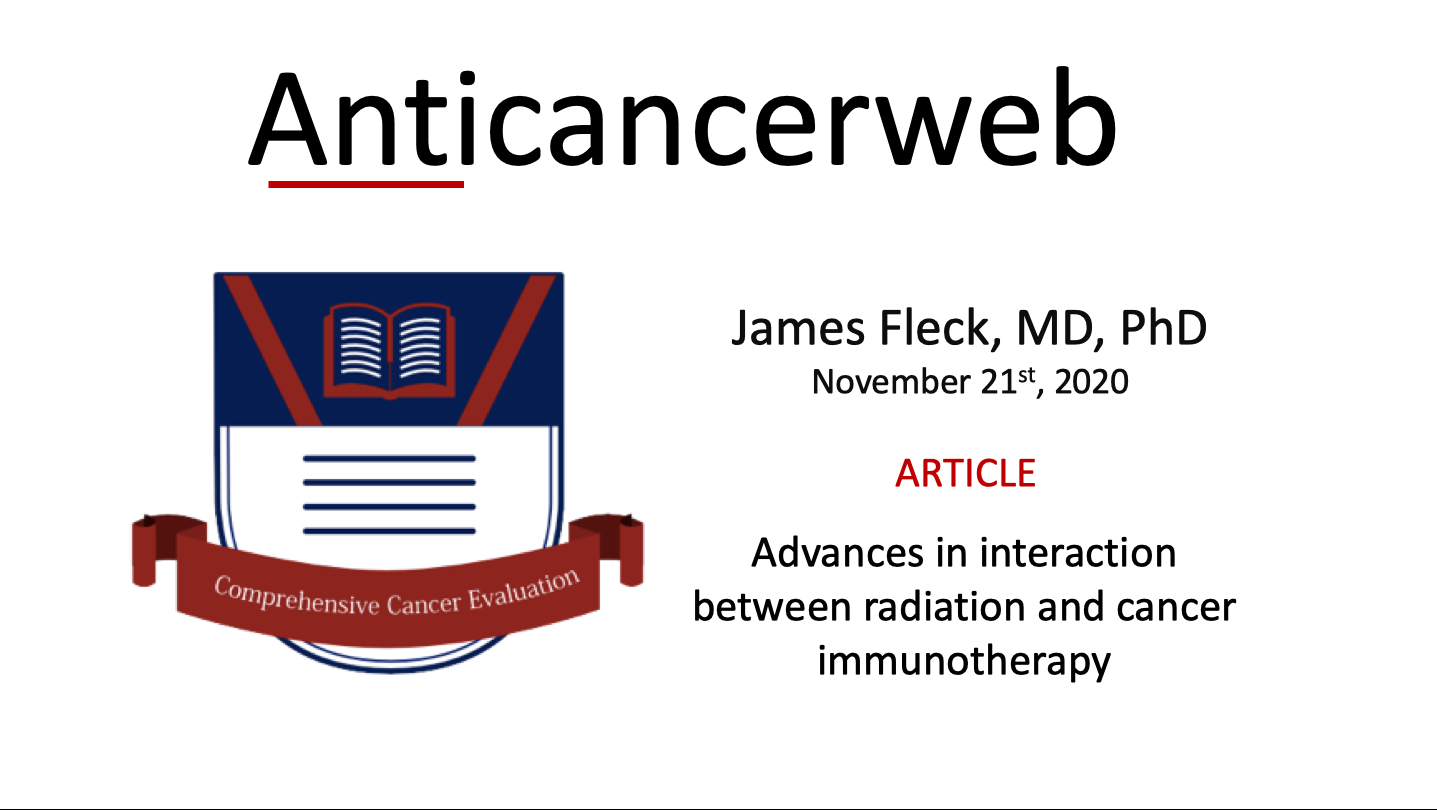
Digging up the abscopal effect and in situ vaccination
James Fleck: Anticancerweb 21(11), 2021
The abscopal effect was a concept described by Mole in the British Journal of Radiology in 1953 to explain a curious immunological phenomenon in which there would be tumor remission at a distance from the primarily irradiated site. The term came from Latin and describes something that is happening away from the target. The rationale involves priming immune cells against tumor antigens released after radiation therapy. As long as, tumor cells are killed by irradiation, released tumor antigens are presented by antigens presenting cells to T-lymphocytes (CD-8+ T cells) which recognize and kill malignant cells away from the primary tumor site. As the abscopal effect was rarely observed, the concept has been abandoned for many years and has only recently been mentioned again with the increasing use of immune checkpoint blockers (anti-CTLA 4, anti-PD1 and anti-PDL1) in cancer therapy.
Recently, the abscopal effect has been revived and associated with in situ vaccination. In May 2019 preliminary results of an interdepartmental research effort conducted by Icahn School of Medicine at the Mont Sinai, New York was published in Nature Medicine. The experimental model included murine tumors and patients with advanced stage indolent non-Hodgkin’s Lymphomas (iNHLs). Usually, iNHLs are poorly responsive to immune checkpoint blockade. Although lymphoma cells can prime tumor antigen-specific T cells in vitro, that direct priming of T cells is not sufficient to induce antitumor immunity in vivo, requiring cross-presentation. Seeking to overcome this limitation, the authors developed a in situ vaccine. They utilized Fms-like tyrosine kinase 3 ligand (Flt3L) to recruit intratumoral cross-presenting dendritic cells (DCs), local radiation therapy to load DCs with tumor-associated antigens and TLR3 agonist to activate DCs. The preclinical model of in situ vaccination revealed marked accumulation of intratumoral cross-presenting DCs, which uptake tumor-associated antigens, generating a systemic tumor-specific CD-8+ T cell response. Use of PD1-blocked monotherapy yielded durable remission. In a phase I trial, patients with advanced iNHLs showed similar expansion of DCs, upregulation of checkpoint molecules and durable remission of distant and untreated tumors. These preliminary results open a new perspective in cancer immunotherapy, demonstrating that the activation of cross-presentation DCs at the tumor site can restart the response of specific T cells against the tumor, restoring the effectiveness of the checkpoint block and, consequently, yielding superior antitumor immunity.
Recently, new translational research strategies of tumor ablation treatment are also digging up the abscopal effect. Highly potent and conformal diffusing alpha-emitters radiotherapy (Alpha DaRT) has been used as an experimental model not only as an efficient local treatment of solid tumors, but also inducing strong systemic antitumor immune responses, which will eliminate local residual disease and tumor metastases.
References:
1. Mole RH: Whole body irradiation; radiobiology or medicine? . Br J Radiol, 26:234-241, 1953
2. Linda Hammerich, Thomas U. Marron, Ranjan Upadhyay, et al: Systemic clinical tumor regressions and potentiation of PD1 blockade with in situ vaccination, Nature Medicine 814 (25): 814–824, 2019
3. Y Keisari: Effective treatment of metastatic cancer by an innovative intratumoral alpha particle-mediated radiotherapy in combination with immunotherapy: A short review, J. Phys.: Conf. Ser. 1662 012016, 2020

As far as I understood from the literature, the abscopal effect is rare and the evidence behind it is still unclear. With checkpoint blockers, it rose from ostracism. However, a rigorous and well conducted trial published in 2020 [1] found no evidence for abscopal effect when combining anti PD-1 therapy to radiotherapy. In this scenario, the Nature Medicine study provides interesting evidence for producing this effect with in situ vaccination. It seems to me that the abscopal effect is not only clinically irrelevant per se but also fruit of the sort of wishful thinking that distorts treatment goals [2]. As merely combining anti-PD1 to radiation seems insufficient to induce abscopal effect [1], new perspectives such as the one in the Nature Medicine paper are invaluable to promote further understanding on the clinical feasibility of this phenomenon. 1: McBride SM, Sherman EJ, Tsai CJ, Baxi SS, Aghalar J, Eng J, Zhi WI, McFarland DC, Michel LS, Spielsinger D, Zhang Z. A phase II randomized trial of nivolumab with stereotactic body radiotherapy (SBRT) versus nivolumab alone in metastatic (M1) head and neck squamous cell carcinoma (HNSCC). 2: Brooks ED, Chang JY. Time to abandon single-site irradiation for inducing abscopal effects. Nature Reviews Clinical Oncology. 2019 Feb;16(2):123-35.
If the studies which goal is to develop the abscopal effect by vaccination in situ manage to generate it on the treatment of malignant tumours and metastasis, it would be a mark on the oncology treatment. Surely the scientific community is on the beginning of something i believe will be the bright future of cancer outcome. The idea of immune cells being able of effectively identify tumour antigens and destroy it's cells gives me hope to decrease cancer bad outcomes.
The article provides insights into how the abscopal effect works, and how it has recently been associated with in situ vaccination and immune checkpoint blockers in cancer therapy. The article concludes by discussing the potential of Alpha DaRT in inducing strong systemic antitumor immune responses. Overall, this article provides a good overview of the recent developments in cancer immunotherapy and the potential of the abscopal effect in improving cancer treatment outcomes.
Please login to write your comment.
If you do not have an account at Anticancerweb Portal, register now.